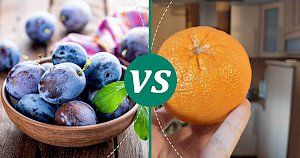Orange vs Plum: Calories & Nutrition Showdown


Orange vs Plum
Nutrition Facts
Serving size:
change
5g10g15g20g30g40g50g60g80g100g120g140g160g180g200g220g250g300g350g400g450g500g600g700g800g900g1000g
1oz2oz3oz4oz5oz6oz7oz8oz10oz12oz15oz20oz25oz30oz35oz40oz50oz
Amount Per Serving:
Serving size:
change
5g10g15g20g30g40g50g60g80g100g120g140g160g180g200g220g250g300g350g400g450g500g600g700g800g900g1000g
1oz2oz3oz4oz5oz6oz7oz8oz10oz12oz15oz20oz25oz30oz35oz40oz50oz
Amount Per Serving:
Orange vs Plum 100g Compare
| per 100g | Orange | Plum |
|---|---|---|
| Calories | 47 | 46 |
| Carbohydrates | 11.75 g | 11.42 g |
| Fat | 0.12 g | 0.28 g |
| Dietary fiber | 2.4 g | 1.4 g |
| Protein | 0.94 g | 0.7 g |
| Calcium | 40 mg | 6 mg |
| Iron | 0.1 mg | 0.17 mg |
| Magnessium | 10 mg | 7 mg |
| Potassium | 181 mg | 157 mg |
| Vitaminium A | 225 µg | 345 µg |
| Vitaminium B1 (Thiamine) | 0.087 mg | 0.028 mg |
| Vitaminium B2 (riboflavin) | 0.04 mg | 0.026 mg |
| Vitaminium B3 (Niacin) | 0.282 mg | 0.417 mg |
| Vitaminium B5 | 0.25 mg | 0.135 mg |
| Vitaminium B6 | 0.06 mg | 0.029 mg |
| Vitaminium B9 (Folic acid) | 0.03 mg | 5 mg |
| Vitaminium C | 53.2 mg | 9.5 mg |
| Vitaminium E | 0.18 mg | 0.26 mg |
Exploring the Nutritional Landscape: Orange and Plum
When it comes to fruits, oranges and plums do not only bring a burst of flavor but also a powerhouse of nutrition. Each of these fruits carries its own set of fascinating facts and health benefits. Oranges, known for their vibrant color and juicy taste, are synonymous with vitamin C and are often associated with boosting the immune system. Plums, with their sweet and slightly tart flavor, are not just a treat to the taste buds but are also packed with antioxidants, aiding in reducing inflammation and protecting against chronic diseases.
Nutritional Face-Off: A Closer Look
Comparing oranges and plums in terms of nutrition might seem like comparing apples to oranges, but it's a comparison worth making. Both fruits are low in calories, with oranges having a slight edge at 49 calories per 100 grams, compared to plums at 46 calories. This makes both fruits excellent choices for those monitoring their calorie intake.
When we dive into the carbs content, both fruits are neck and neck, with oranges providing 11.89 grams and plums slightly less at 11.42 grams per 100 grams. This similarity continues in their dietary fiber content, although oranges pull ahead with 2.5 grams of fiber compared to 1.4 grams in plums, making oranges a slightly better option for those looking to increase their dietary fiber intake.
The battle of vitamins and minerals is where things get interesting. Oranges significantly outshine plums in vitamin C content, boasting 48.5 mg per 100 grams, a vital nutrient for immune function, skin health, and much more. Plums, on the other hand, offer a higher vitamin A content at 345 IU, which is essential for vision and immune health. Both fruits offer a range of other vitamins and minerals, including vitamin B6, potassium, and magnesium, contributing to their overall nutritional value.
What About the Sugar and Fat Content?
Both oranges and plums have a low fat content, with oranges at 0.3 grams and plums at 0.28 grams per 100 grams, making them heart-healthy choices. The sugar content is not specified, but both fruits, like most in their category, contain natural sugars that provide a quick energy source. It's the fiber in these fruits that helps to moderate blood sugar levels, making them a smart option for a sweet treat.
So, Which One Should You Choose?
The choice between an orange and a plum may come down to personal preference or specific dietary needs. If you're looking for a vitamin C boost, oranges are your go-to. For those seeking higher vitamin A and a slightly lower calorie option, plums might be the fruit to reach for. Ultimately, incorporating a variety of fruits, including both oranges and plums, into your diet is the best way to ensure you're getting a broad spectrum of nutrients and health benefits.
In conclusion, while oranges and plums each have their unique nutritional profiles, both are excellent additions to a healthy diet. By understanding the nutritional nuances of these fruits, you can make informed choices that contribute to a balanced and nutritious diet, adding a splash of color and flavor to your meals.
Orange 100g
47kcalCalories source
- 91% CARBS.
- 7% PROTEIN
- 2% FAT
Plum 100g
46kcalCalories source
- 90% CARBS
- 5% PROTEIN
- 5% FAT
Compares of orange
- Orange vs Apple
- Orange vs Apricot
- Orange vs Avocado
- Orange vs Banana
- Orange vs Blackberry
- Orange vs Blackcurrants
- see all compares of orange
Marcin Piotrowicz
calories-info.com creator
Healthy diet and healthy lifestyle promoter
Add comment